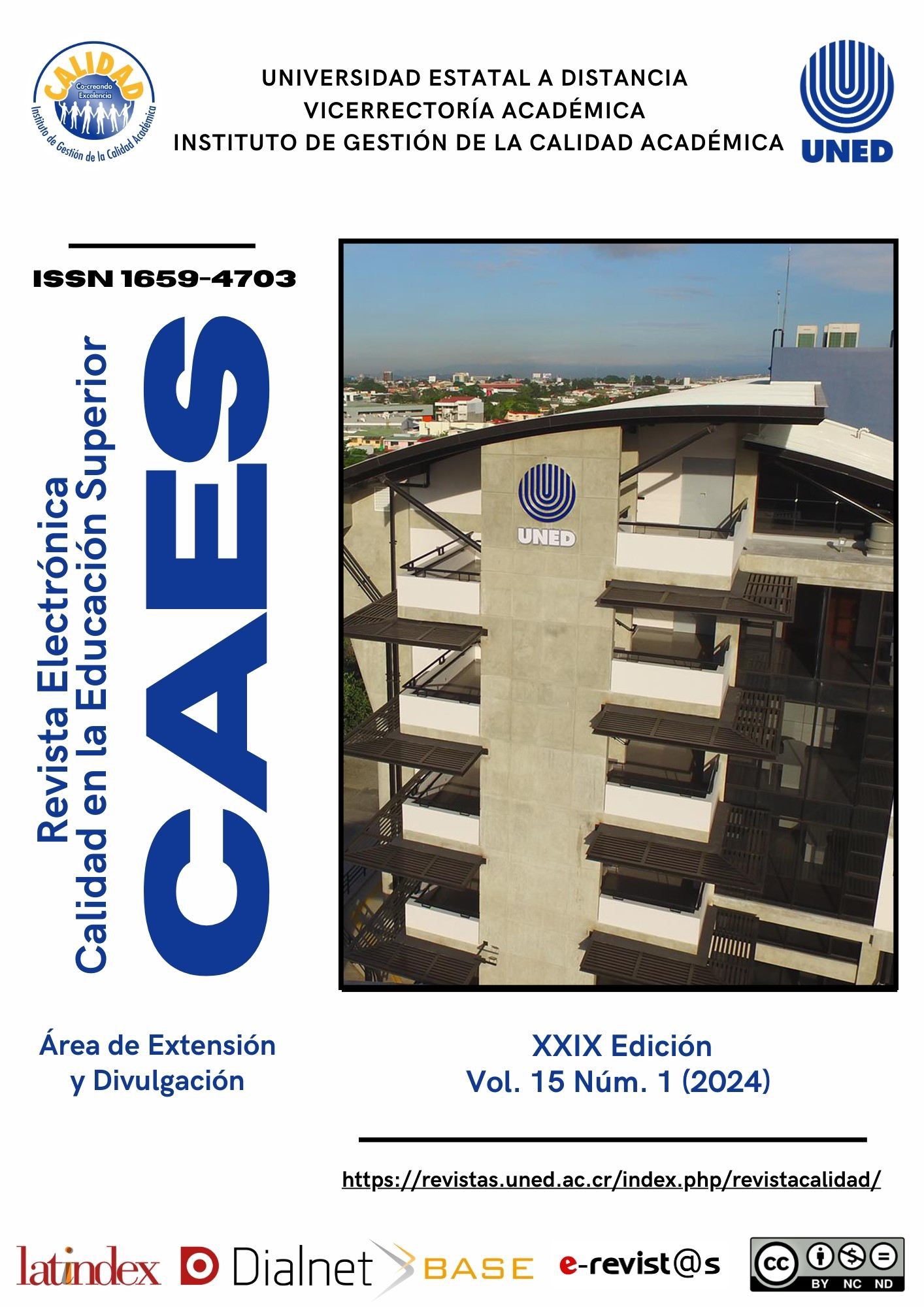Tracking the 2020-2022 Graduate Population of the Bachelor's Degree in English with Business Management Training in Costa Rica
DOI:
https://doi.org/10.22458/caes.v15i1.5043Keywords:
HIGHER EDUCATION, ENGLISH, BUSINESS MANAGEMENT, BILINGUAL EDUCATION, PROFESSIONSAbstract
The objective of this study is to gather information of the professionals graduated from 2020 to 2022 from the Bachelor in English with Business Management from the University of Costa Rica, Pacific Campus, in order to gather reliable data in terms of their professional careers, further professional development and personal view about possible improvement areas in the curricula that would allow them to achieve the current market demands and would contribute to decision making processes. The information was gathered through a structure questionnaire applied to all the population graduated in the years 2020, 2021 and 2022. The analysis was descriptive, with a quantitative approach, and demonstrated that the Major does permit a quick immersion in the workforce by training bilingual professionals with knowledge in business management, but it suggests a prompt reestablishment of these two areas for a better union of the two disciplines.
References
Barboza Jiménez, Lucrecia. y Ocampo Bermúdez, Giannina. (2020). Opinión de la población graduada, con respecto a sus necesidades de formación y actualización profesional de la carrera de Bibliotecología y Documentación de la Universidad Nacional de Costa Rica. Bibliotecas, 38(1), 1-22. http://dx.doi.org/10.15359/rb.38-1.4
Consejo Nacional de Rectores. (2019). Radiografía laboral 2022. https://radiografia.conare.ac.cr/radiografia-laboral-iv-2022/
Córdoba Iñesta, Ana; González-Navarro, Pilar; Llinares Insa, Lucía. y Zacarés González, Juan. (2020). Indicadores de empleabilidad: de la inclusión al desarrollo de las carreras laborales. Revista Jurídica de Economía Social y Cooperativa, (36), 365-387. 10.7203/CIRIEC- JUR.36.17016
Corredera Marmolejo, Alejandro; Febles Álvarez, Mónica; Flores Machado, Pilar; Guzmán Silva, Susana; Rodríguez Reynaga, Pedro. y Tuyub España, Arumi. (2008). Estudio de seguimiento de egresados: recomendaciones para su desarrollo. Innovación Educativa, 8(42), 19-31. https://www.redalyc.org/pdf/1794/179421234003.pdf
España Chavarría, Carolina. (2010). El idioma inglés en el currículo universitario: importancia, retos y alcances. Revista Electrónica Educare, XIV(2), 63-69. https://www.redalyc.org/pdf/1941/194115606005.pdf
Gutiérrez Durán, José. y Solano Araya, J. (2020). Teletrabajo: Motivación y desempeño laboral en Costa Rica en el contexto de la Pandemia del COVID-19. Revista Cuadernos de Administración, 1(1), 15-28. https://revistasecauned.com/index.php/cda/article/view/3/40
Montoya Díaz, Eleem. (2019). Importancia de prácticas profesionales en la carrera de Contaduría Pública y Finanzas. Revista Multi-Ensayos, 5(9), 22-26. 10.5377/multiensayos.v5i9.9432
León Manjarrés, Catherine. (2006). Importancia del dominio del idioma inglés en el desempeño del profesional en áreas administrativas, contables y económicas de Bogotá [Trabajo de Investigación para optar por el título de Administradora de Negocios con Énfasis en Finanzas, Universidad de San Buenaventura]. http://biblioteca.usbbog.edu.co:8080/Biblioteca/BDigital/37602.pdf
López Montero, Rosberly. (2018). Caracterización de la primera generación de estudiantes de la carrera Inglés con Formación en Gestión Empresarial. Revista de Lenguas Modernas, (28), 475-494. En https://revistas.ucr.ac.cr/index.php/rlm/article/view/34851
Paoli Bolio, Francisco. (2019). Multi, inter y transdisciplinariedad. Problema anuario de filosofía y teoría del derecho, (13), 347-357. https://www.redalyc.org/articulo.oa? id=421971714016
Salas Madriz, Flora. (2006). Los estudios de seguimiento de la población graduada como herramienta para el cambio y la innovación en el currículo universitario: la experiencia de la Escuela de Administración Educativa de la Universidad de Costa Rica. Revista Educación, 30(2), 63-81. https://doi.org/10.15517/revedu.v30i2.2230
Universidad de Costa Rica. (1974). Estatuto Orgánico. San José.
Zomerdijk, Leonieke y de Vries, Jan. (2007). Structuring front office and back office work in service delivery systems: An empirical study of three design decisions. International Journal of Operations & Production Management, 27(1), 108-131. https://doi.org/10.1108/01443570710714565
Downloads
Published
How to Cite
Issue
Section
License
Copyright (c) 2024 Revista Electrónica Calidad en la Educación Superior

This work is licensed under a Creative Commons Attribution-NonCommercial 4.0 International License.
Esta revista provee acceso libre inmediato a su contenido bajo el principio de que hacer disponible gratuitamente la investigación al publico, lo cual fomenta un mayor intercambio de conocimiento global.
